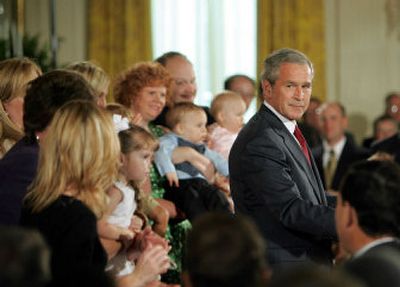President vetoes stem cell bill

WASHINGTON – President Bush framed the first veto of his presidency Wednesday as a matter of morality rather than politics, but it will surely have political impact that could damage Republicans in November’s congressional elections.
Bush’s veto struck down legislation that would expand federal research on embryonic stem cells aimed at finding cures for many diseases. He said he vetoed the bill because it would lead to destroying embryos that could develop into human life, and thus “it crosses a moral boundary that our decent society needs to respect.”
The president spoke at the White House, where he’d gathered 18 families that included children born from implanted embryos, to illustrate his point. “These boys and girls are not spare parts,” Bush said. “And they remind us that in our zeal for new treatments and cures, America must never abandon our fundamental morals.”
Bipartisan majorities in Congress oppose his stand. So do a majority of the American people, polls show. They agree with scientists who argue that the spare embryos in question come from fertility clinics, where they’d otherwise be destroyed. Scientists say research on stem cells could lead to cures for Parkinson’s disease, Alzheimer’s, spinal cord injuries and other illnesses that afflict millions of Americans.
The president’s choice for such a signature event is thus fraught with potential political consequences. While it may curry favor with religious conservatives, who compose the cornerstone of his political base, his stand may alienate moderate Republicans, independent voters and others who see the research as key to helping save lives. Most Democrats champion the stem-cell bill, as do many Republicans, including Nancy Reagan, California Gov. Arnold Schwarzenegger and Sen. Orrin Hatch, R-Utah.
Congressional Democrats made clear Wednesday that they intend to make Bush’s veto a central campaign issue in November’s elections, as they vowed at a Capitol Hill rally to fight on to pass the legislation. They lack the two-thirds majorities needed to override Bush’s veto in Congress, however; the House of Representatives fell 50 votes short of the total needed when it voted 235-193 Wednesday night to override, cementing Bush’s veto at least for this year.
“Whether it’s this year or with a new Senate and a new House and the next president, this will become the law of the United States,” Sen. Charles Schumer of New York vowed at a rally of Democratic lawmakers on Capitol Hill. Schumer heads the Senate Democrats’ campaign committee for November’s elections.
Political analysts see Bush’s veto as a plus for the Democrats.
“On the Democratic side of things, it’s an ace in the hole. It’s a good wedge issue and a good base issue that appeals to crossover Republicans,” said John Zogby, an independent pollster. “For the president, it’s business as usual. This is a guy who’s staked his entire career on shoring up the base, and this is a base kind of issue.”
The stem cell issue is already central in Missouri, where the national Democratic Party is highlighting Republican Sen. Jim Talent’s opposition to the bill in an effort to deny him re-election. His Democratic challenger, state Auditor Claire McCaskill, bashes him on the issue at virtually every stop and is leading him in polls.
Whether the veto will endanger Republican lawmakers at the polls is debatable.
“They will deal with it in the way they have dealt with it in the past,” said House Majority Leader John Boehner, R-Ohio. “And I don’t see any huge consequences politically on this issue.”